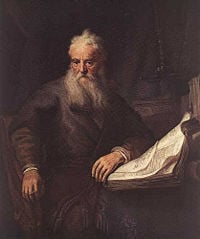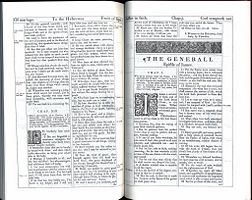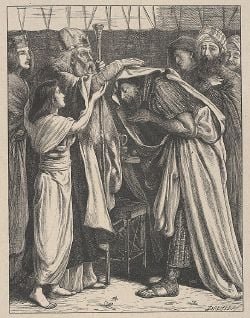Epistle To The Hebrews
 From Nwe
From Nwe
| New Testament |
|---|
The Epistle to the Hebrews is one of the books in the New Testament. Though traditionally credited to the Apostle Paul, the letter is anonymous and most modern scholars, both conservative and critical, believe its author was not Paul himself but a member of the later Pauline Christian community.
Written to encourage its readers not to "shrink back" from testifying to Jesus or return to Judaism, Hebrews is more a sermon than a letter. It portrays Jesus as the high priest who sacrificed himself to atone for humanity's sins, superseding the sacrifices of the "old covenant" mediated by Moses, which it characterizes as "obsolete." Jesus is depicted as a priest "according to the order of Melchizedek," whose offering is made only once, while the sacrifices of Levite priests need to be made yearly and are ineffective in any case. Only through faith in Jesus' atoning death and one's own perseverance through suffering until his reappearance will God's grace of salvation be assured.
Hebrews also teaches the existence of a spiritual realm of which the earthly world is but a reflection. The powerful rhetorical style of the Epistle to the Hebrews made it one of the more influential New Testament books.

Authorship

The author of Hebrews is not known. The text as it has been passed down to the present time is internally anonymous, though ancient title headings often attribute it to the Apostle Paul.[1] However, even in antiquity doubts were raised about Paul's authorship.
The reasons for this controversy are fairly plain. First, all of Paul's other letters contain an introduction that claims Pauline authorship, yet Hebrews does not. Also, while much of its theology and teachings are considered Pauline, Hebrews contains many ideas which seem to have no such root. For example, salvation does not seem to come at the time of baptism, but only by waiting faithfully for Christ's second coming (9:28). Moreover, this writer goes much farther than Paul in divorcing Christianity from its Jewish roots, declaring not only that Gentile Christians need not become Jews, but that the "old covenant" itself is both flawed and obsolete. Moreover, the writing style is substantially different from that of Paul's authentic epistles, a characteristic first noticed by Clement of Alexandria (c. 210). In addition, Hebrews admits to have been written by a person who received the Christian message from others,[2] while in his letter to the Galatians, Paul adamantly insists that he received his gospel directly from the resurrected Jesus himself.
In response to the doubts raised about Paul's involvement, other possible authors were suggested as early as the third century C.E. Origen (c. 240) suggested that either Luke the Evangelist or Clement of Rome might be the author.[3] Tertullian proposed Paul's companion Barnabas.
Nevertheless, in the fourth century, the church largely agreed to include Hebrews as the fourteenth letter of Paul. Jerome and Augustine of Hippo were influential in affirming Paul's authorship, and the Catholic Church affirmed this authorship until the Reformation and beyond. Arguing in favor of Paul's authorship are such factors as the letter's basic Pauline theology, many Pauline themes, the use of language often similar or the same as Paul's, and a reference to Paul's frequent companion Timothy in the closing lines.
During the Reformation, Martin Luther proposed Apollos—"a learned man" (Acts 18:24), popular in Corinth (1 Cor 1:12), and adept at using the scriptures and arguing for Christianity while "refuting the Jews" (Acts 18:27–28)—as its author. In more recent times, some scholars have advanced a case for the authorship of Hebrews belonging to Priscilla or Silas.
In general, the evidence against Pauline authorship has convinced most scholars that the letter is not by Paul, an attitude shared by conservative and critical scholars alike.
Audience and date
Hebrews was written to an audience facing very specific circumstances:
- The original readers of the letter were apparently conversant in the Septuagint translation of the Old Testament, as the author's usage shows.
- The types of sins listed in chapter 13 suggest they lived in a city.
- They had once faced persecution (10:32–34), but not to the point of shedding blood (12:4).
- Some had stopped assembling together because of persecution (10:25).
- As the author saw it, some among them were being tempted to avoid severe persecution by "shrinking back" [10:32-39] from the apostolic witness to Jesus Christ. (It is debated whether the anticipated persecution was from secular (i.e., Roman) authorities or Jewish authorities, or both.)
- In 13:24 the author says that those from Italy greet the readers, taking by many scholars to imply that its audience may have been located in Rome.
The letter's audience is often thought to be Jewish Christians, although recent scholarship sometimes question this presumption. In either case, Hebrews affirms that non-Jewish followers of Jesus do not need to convert to Judaism in order to share God's covenant, but it is even more concerned to show that the "old covenant" itself is obsolete.
Hebrews has been dated to shortly after the Pauline epistles were collected and began to circulate, c. 95 C.E., but this is far from certain.
Style
Hebrews is a very consciously "literary" document. The purity of its Greek was noted by Clement of Alexandria, and Origen asserted that every competent judge must recognize a great difference between this epistle and Paul's (Eusebius, VI, xxv). However, Hebrews does not fit the form of a traditional Hellenistic epistle, lacking a proper prescript. Modern scholars generally believe this book was originally a sermon or homily, although possibly modified after it was delivered to include the travel plans, greetings and closing (13:20-25).[4] However, others suggest that it may once have contained an opening section more typical of a letter, which was later lost.
This letter consists of two strands: an expositional or doctrinal strand (1:1–14; 2:5–18; 5:1–14; 6:13–9:28; 13:18–25), and a hortatory or ethical strand which punctuates the exposition parenthetically at key points as warnings to the readers (2:1–4; 3:1–4:16; 6:1–12; 10:1–13:17).
Summary
In the past God spoke through the prophets, but in these "last days," he speaks through his Son, who sits at God's right hand and is even higher than the angels. (Chapter 1) Care must be taken not to "drift away" from the Son, for angels who are merely "ministering spirits," and their teaching is not binding. Although Jesus became lower than the angels when he lived on earth and even suffered death, God has now made all things subject to him. Jesus is our savior, but he is also our brother, for he has made us all one family. He was made like his brothers in every way, suffering not only death, but temptation, in order to atone for his brothers' sins. (Chapter 2)
As a faithful son of God, Jesus is worthy of even greater honor than Moses. Those who know him must not lose faith and turn back, like those Israelites who rebelled against Moses and wished to return to Egypt. (Chapter 3) God has promised a Sabbath to those who are faithful, and today that promise if fulfilled to those found worthy to enter his "rest." Jesus is the great high priest of the current era, who was tempted like all of us yet found without sin, so we may approach God's throne with confidence of His grace. (Chapter 4) Jesus' priesthood is of the "order of Melchizedek." The writer's audience has been too immature to learn much more of this, being like infants who need "milk, not solid food." (Chapter 5) Now it is time for more advanced instruction.
A hard teaching follows: Those who fall away from faith in the gospel after having believed can never be brought back to repentance, because "they are crucifying the Son of God all over again and subjecting him to public disgrace." However, the writer is confident that his audience will persevere. Moreover, the promises of God—who swore an oath in his own Name to Abraham and fulfilled it—are faithful. (Chapter 6)
Melchizedek was not only a priest, but the King of Salem, which means King of Peace; and to him Abraham offered a tenth of his plunder. Jesus, being from the tribe of Judah, is not of the Levite priesthood, but belongs to that of Melchizedek, not because of his ancestry but "on the basis of the power of an indestructible life." In this way, the former levitical law has been set aside, because "it was weak and useless." Earthly priests' offices end when they die, but Jesus lives forever. Moreover, his sacrifice is not made daily, as with levitical priests, but was made once and for all time. (Chapter 7)
The high priest who served in the tabernacle ministered in but the shadow of a heavenly sanctuary. Moreover, "if there had been nothing wrong with that first covenant, no place would have been sought for another." Yet God promised that he would institute a new covenant with Israel and Judah: "I will put my laws in their minds and write them on their hearts... I will forgive their wickedness and will remember their sins no more." The previous covenant is thus "obsolete." (Chapter 8) Under the first covenant, the high priest alone could enter the Holy of Holies once per year, and only after first offering a blood sacrifice for the sins of himself and the people. Christ's sacrifice of his own blood opens the way for those who are called to be cleansed in their consciences and serve God, for "he has died as a ransom to set them free from the sins committed under the first covenant." His sacrifice was offered not in an earthly temple but in heaven. Moreover, he will appear a second time, not to bear sin this time, but "to bring salvation to those who are waiting for him." (Chapter 9)
The law is merely the shadow of good things to come, and can never bring perfection; otherwise sacrifices would no longer be necessary. In reality the blood of goats and bulls cannot take away sin. Christ taught that God is not pleased with burnt offerings, but by the accomplishment of His will. It is as a result of God's will that "we have been made holy through the sacrifice of the body of Jesus Christ once for all." Christ's body is the "curtain" through which we may enter the Holy Place with confidence, our hearts being made pure through the sprinkling of his blood, and our bodies purified through the washing of baptism. We must therefore "hold unswervingly to the hope we profess." Those who persist in sin or who "shrink back" for the faith will face a terrible fate on the day of judgment, but "those who believe will be saved.” (Chapter 10)
Faith is "being sure of what we hope for and certain of what we do not see." It is by faith that the providential figures of the past succeeded, people like Abel, Enoch, Noah, Abraham, Sarah, Jacob, Moses, Rahab the harlot, the judges, kings and prophets. Yet they did not receive the results of God's promise, but only saw them from a distance. "God had planned something better for us so that only together with us would they be made perfect." (Chapter 11)
This "cloud of witnesses" surrounds us, so we should cast aside the weight of doubt "fix our eyes on Jesus," who endured the shame of the cross for our sake, as well as for the joy he would receive upon ascending to God and His throne. The readers may have suffered in their struggles against sin, but not yet to the point of blood. Whatever hardships may come, they must endure it faithfully, as sons receiving discipline from God, their father. They must therefore "strengthen your feeble arms and weak knees." They must shun those who are sexually immoral or who deny God, like Esau, who sold his inheritance for a single meal.[5] Christians have not come to the physical Mount Zion, like the earlier Israelites, but to the spiritual one, mediated not by Moses, but by Jesus, whose blood speaks even better than that of Abel. We must not refuse him, but should "worship God acceptably with reverence and awe, for our God is a consuming fire." (Chapter 12)
The writer concludes with an exhortation to brotherly love, hospitality, and visiting those in prison. Marriage should be considered honorable, for the marriage bed is pure (some translations read "should be kept pure"), but God will punish adulterers. Christians should not desire money, but be content with what they have. The church's early leaders should be remembered and imitated as examples of Christ, for "Jesus Christ is the same yesterday and today and forever." Members should not pay attention to those who teach the eating of certain "ceremonial foods," for "we have an altar from which those who minister at the tabernacle have no right to eat." We should prepare ourselves even to be sacrificed, and to confess Jesus' name. Church leaders must be obeyed. The writer asks for prayers that he may "be restored to you soon." He informs the readers that Timothy has been released and may join the writer in coming to the readers if Timothy arrives soon enough. In closing, the author sends greeting from those from Italy and offers a brief benediction of grace. (Chapter 13)
Significance
Hebrews left an important legacy both theologically and in terms of its social impact. One of its most famous verses is its definition of faith as "the substance of things hoped for, the evidence of things not seen," (11:1 KJV) which has come to be firmly associated with Saint Paul, although few scholars today believe it belongs to him. Its portrayal of Jesus as the high priest who offered himself for the redemption of the sins of those who believe became emblematic in Christian theology. So too did Hebrews' characterization of the distinction between the "old" and "new" covenants. Indeed, some trace the origin of the term "New Testament" to this writing. In portraying the "old covenant" as flawed and obsolete, the author also set the stage for Christianity's ultimate divorce from Judaism. Just as Hebrews exaggerated Paul's criticism of the Jewish law, later Christian authorities would exaggerate Hebrews' attitude to the point of characterizing Judaism as rejected by God, forbidding Christians from associating with members of the synagogue, and even justifying the persecution of Jews.
Hebrews is also important because of its view of the heavenly realm. This attitude influenced the later development of Christian Neo-Platonism, as well as fostering the belief in conscious survival of the conscious human person in the afterlife. Its powerful rhetorical style and clear summary of Pauline themes, even if overstated, made it one of the most influential of "Paul's" letters in the second century church and throughout much of Christian history.
Notes
- ↑ A number of manuscripts, namely the earliest extant (P46), bear the title of simply, "To the Hebrews," without Paul's name.
- ↑ Hebrews 2:3–4
- ↑ Eusebius, Church History 6.25.11-14.
- ↑ Ehrman, 2004, 411.
- ↑ This may be a reference to those who eat food sacrificed to idols, a practice banned in the early church.
References
ISBN links support NWE through referral fees
- Attridge, Harold W., and Helmut Koester. Hebrews: A Commentary on the Epistle to the Hebrews. (Hermeneia: a critical and historical commentary on the Bible). Augsburg Fortress Press, 1989. ISBN 978-0800660215
- Ehrman, Bart D. The New Testament: A Historical Introduction to the Early Christian Writings. Oxford University Press, 2003. ISBN 978-0195154627
- Heen, Erik M. and Krey, Philip D.W. (eds.). Hebrews: Ancient Christian Commentary on Scripture. Intervarsity Press, 2005. ISBN 978-0830814954
- Guthrie, Donald. Tyndale New Testament Commentaries: The Letter to the Hebrews. Wm. B. Eerdmans Publishing Co., 1983. ISBN 978-0802814272
- M'Cheyne, Robert Murray. The Glory of the Christian Dispensation (Hebrews 8 & 9). Diggory Press, 2007. ISBN 978-1846857034
- Phillips, John. Exploring Hebrews (Revised). Kregel Academic & Professional, 2002 (original 1977). ISBN 978-0825434808
External links
All links retrieved March 8, 2019.
- Online Bible: Hebrews GospelHall.org.
- Goodspeed's analysis of Hebrews earlychristianwritings.com.
- Catholic Encyclopedia: Epistle to the Hebrews newadvent.org.
|
|||||||||||||||||
Credits
New World Encyclopedia writers and editors rewrote and completed the Wikipedia article in accordance with New World Encyclopedia standards. This article abides by terms of the Creative Commons CC-by-sa 3.0 License (CC-by-sa), which may be used and disseminated with proper attribution. Credit is due under the terms of this license that can reference both the New World Encyclopedia contributors and the selfless volunteer contributors of the Wikimedia Foundation. To cite this article click here for a list of acceptable citing formats.The history of earlier contributions by wikipedians is accessible to researchers here:
The history of this article since it was imported to New World Encyclopedia:
Note: Some restrictions may apply to use of individual images which are separately licensed.
↧ Download as ZWI file | Last modified: 02/03/2023 22:09:34 | 140 views
☰ Source: https://www.newworldencyclopedia.org/entry/Epistle_to_the_Hebrews | License: CC BY-SA 3.0
 ZWI signed:
ZWI signed:


 KSF
KSF